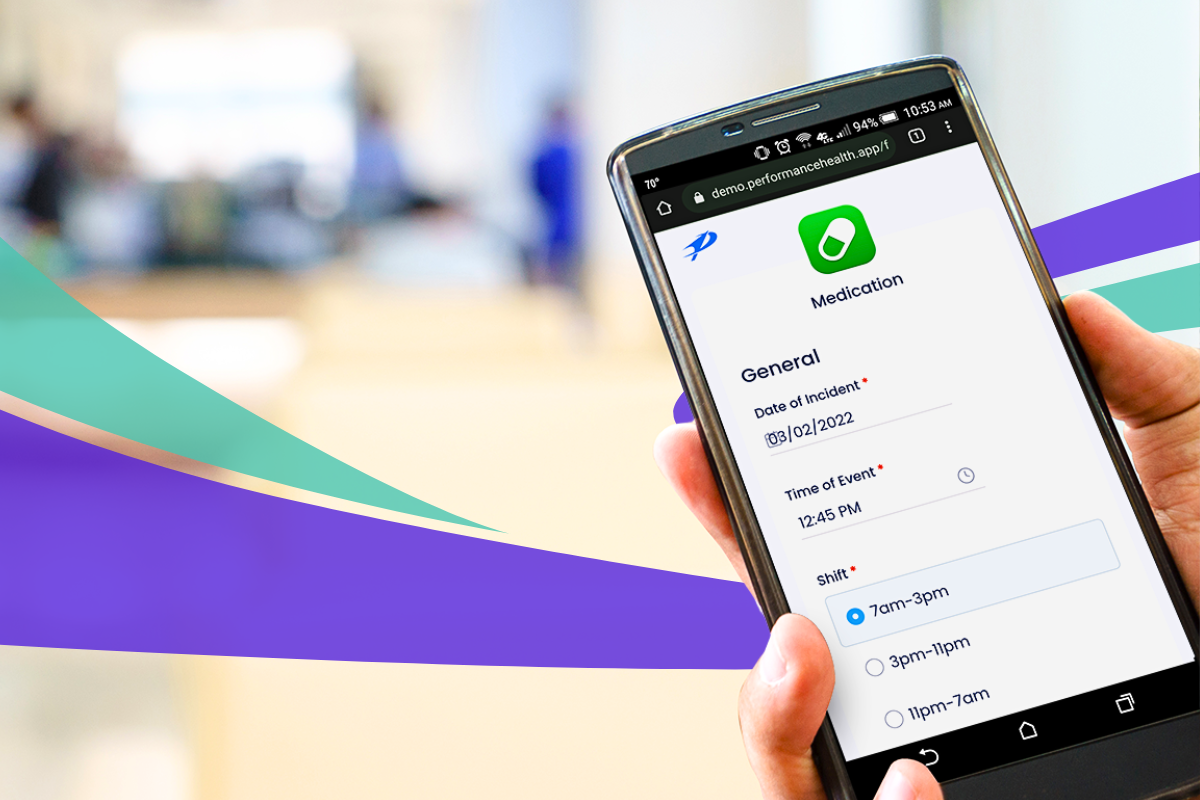4 min read
Choosing the Right Event Management Software Company
Performance Health Partners
June 9, 2025

Small oversights can have big consequences in healthcare. That’s why choosing the right event management software company isn’t just about checking boxes on a feature list. The right tool helps teams catch safety issues early, report issues quickly, and learn from what went wrong—without making it harder to do the work. But with so many options out there, how do you choose a platform that actually fits the way your organization works?
This guide offers a comprehensive overview of the features to look for in an incident and event management system, along with key considerations to help you make an informed decision.
Assessing Your Current System & Needs
According to the Agency for Healthcare Research and Quality’s (AHRQ) 2022 Patient Safety Culture Survey, fewer than half of healthcare workers believe they have the right tools to report safety events effectively.
This gap is why it’s so important to evaluate where your current event management system succeeds—and where it’s falling short.
Asking the right questions can help you identify gaps:
- Is your current system supporting all relevant regulatory requirements?
- Are incident reports being completed consistently and accurately?
- Do users find the current system easy to navigate?
- How secure is your incident and event data?
This kind of tech audit can help you spot what’s not working and where things could be better.
You should also think about what you want your new incident management system to do. Do you want to make compliance easier? Take some tasks off your clinical team’s plate? Speed up how fast you respond to issues? Knowing your goals upfront will make it easier to find the right software.
Also, don’t overlook the value of user feedback. Staff who interface with your current system—nurses, physicians, quality teams, and administrators—can provide critical insights into challenges and needed features. Collect their feedback through focus groups, surveys, or informal interviews to ensure your new system reflects real-world needs.
Must-Have Features in Incident and Event Management Software
Once your organization’s goals and challenges have been clearly defined, you can begin evaluating specific features to look for in a new solution. Below are a few that are must-haves.
Intuitive User Interface
An effective incident management system should be easy to use for all staff members. Whether a team member is tech-savvy or not, the software should offer a clean, intuitive layout with guided steps and minimal data entry so that anyone can use it. This encourages prompt and accurate reporting, which in turn supports timelier follow-up and analysis.
Software that allows custom form fields, prompts, and/or templates tailored to your facility’s workflows and language is a huge plus. This customization ensures the tool reflects your processes, not the other way around.
Seamless Integration
Your incident data shouldn’t exist in a silo. Choose an event management software company whose product connects easily with your existing electronic health records and other internal systems. Integration improves accuracy, reduces duplicate data entry, and provides a more complete view of patient safety trends.
Analytics & Reporting Tools
Hospitals using advanced analytics to monitor safety trends have seen a 37% improvement in identifying preventable harm.
This makes robust, customizable reporting features a must-have when evaluating any event management software company.
One of the biggest advantages of event management software is its ability to turn data into insight. Look for an event management software company that offers both pre-built and customizable dashboards to visualize trends, spot recurring issues, and monitor how well risk management and prevention strategies are working.
Automated reports that can be scheduled and exported in different formats (e.g., Excel, PDF) help maintain transparency and accountability throughout the organization.
Mobile Accessibility
Healthcare professionals are constantly on the move—between patient rooms, departments, or even remote locations. For this reason, mobile compatibility is a critical component of event management software.
Your system should allow incident and event reporting and follow-up from smartphones or tablets, enabling real-time documentation at the point of care. This improves data accuracy and ensures events aren’t forgotten or misreported later.

Compliance & Security
Healthcare organizations are responsible for protecting sensitive patient information and adhering to data protection laws such as HIPAA. The right software should offer:
- Data encryption both in transit and at rest
- Role-based user access controls
- Secure login and authentication options
- Detailed audit logs for tracking system activity
These measures protect both patient information and the integrity of your internal processes, ensuring you’re prepared for audits or regulatory reviews.
What to Consider When Evaluating an Event Management Software Company
Once you know the features you need, choosing the right event management software vendor is the next step.
Experience in Healthcare
Select a partner that understands the nuances of the healthcare environment. Proven experience in hospitals, clinics, and long-term care facilities will ensure the software is built to support your specific needs.
Resources like KLAS Research’s reviews and industry rankings can help you compare vendors and get feedback from peers who have implemented the systems you’re considering.
Support & Training
Even the best software won’t be effective without proper training. Ask about onboarding, live support, and ongoing education.
Do they offer in-person sessions, self-paced learning, or dedicated account managers? Strong vendor support makes all the difference during implementation and beyond.
Scalability
Will the event management software grow with your organization? If you add new departments or expand your services, the system should handle increased demand without sacrificing performance.
Cloud-based platforms often offer more flexibility and can be updated with new features or modules as your needs evolve.
Transparent Pricing
Finally, be sure that you’re clear on the total cost of ownership. A low initial price may not reflect the full expense once you factor in training, integrations, updates, and ongoing support.
Make sure you understand the full cost of ownership. Beyond the initial purchase, ask about fees for training, upgrades, support, and system maintenance. A transparent pricing structure helps you plan and avoid hidden costs.
Ask for a detailed breakdown of all costs—license fees, user limits, implementation charges, and more. Some vendors offer bundled pricing, while others charge à la carte for specific features or services. Knowing the full picture will help you avoid surprises and budget more accurately.
Final Thoughts
Selecting the right event management software company is an investment in your organization’s safety culture and operational excellence. By understanding your current challenges, identifying key objectives, and prioritizing must-have features, you’ll be well positioned to choose a solution that delivers long-term value.
Engage your staff in the selection process, evaluate vendors carefully, and look for a system that not only meets today’s standards but is also adaptable to tomorrow’s needs.


